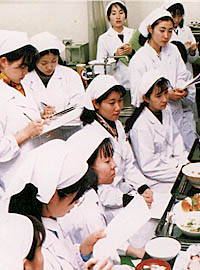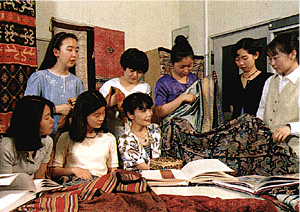The Faculty of Home Economics, the first of its kind in Japan, has been a part
of the University since its inception. It was the belief of Jinzo Naruse that by making a
comprehensive investigation of household life through the study of home economics,
students would develop as human beings and become valuable contributors to society.
Students of home economics pursue issues related to daily life from the
perspectives of the natural sciences, humanities, and social sciences. By once again
applying the fruits of their studies to daily life, it is hoped that they will achieve
more abundant, ration-al lives and ultimately contribute to human welfare. Put in another
way, the field of home economics involves a comprehensive, multi-faceted study of daily
life in its broadest and deepest sense.
The Faculty of Home Economics consists of the Departments of Child Studies, Food
and Nutrition, Housing and Architecture, Clothing, and House-hold Economics.
Students in the Department of Child Studies seek to
achieve a comprehensive understanding of how best to contribute to the healthy growth and
development, both physical and mental, of children. To this end they draw on the wisdom of
a wide range of academic disciplines, including psychology, pedagogy, and sociology.
In the Department of Food and Nutrition, students attempt
a scientific clarification of what food is and learn the type of diet that is needed to
develop and maintain a healthy mind and body. They also master the knowledge and
techniques necessary to design more rational eating plans as the modern diet grows
increasingly diverse and complex.
The Department of Housing and Architecture consists
of two courses-the Study of Living and Housing, and the Study of Architecture. Both
courses share the Department's guiding principle of studying the relationship between
human being and the built environment practically, that is from the stand point of those
who live and dwell in that environment. Students gain a solid academic foot-ing in the
many scientific fields needed to under-stand the present environment and to create a
better social and built environment for future human beings, as well as basic practical
skills.
Students in the Department of Clothing study
clothing as a part of the human environment based on a broad perspective. Courses include
textile manufacture, the planning, design, marketing, distribution and consumption of
textile products and clothing, and the history and aesthetics of clothing and accessories.
In the Department of Household Economics, students learn to use the methodology
of economics to probe problems relating to daily life. Students pursue their studies and
research in the social sciences with an emphasis on economics.
In addition to the departments listed above, the Faculty of Home Economics also
boasts a correspondence course. This course, which includes
the Departments of Child Studies, Food and Nutrition, and the Living Arts, allows students
of any age to study when they want and according to their circumstances. Befitting its
status as Japan's only correspondence course for home economics, the course features many
laboratory and hands-on courses, and textbooks written by course instructors are
complemented by direct classroom teaching.
